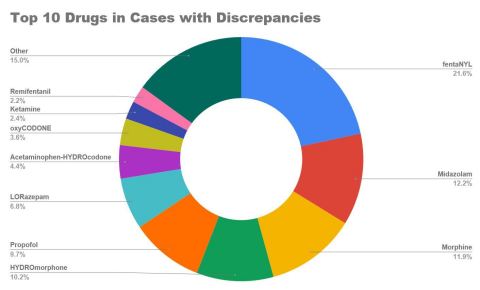WASHINGTON--(BUSINESS WIRE)--Kit CheckTM, the leader in automated medication management solutions for hospitals, today announced that its Bluesight for Controlled Substances diversion prevention and controlled substance management solution has closed over one million cases*. Bluesight for Controlled Substances (BCS) utilizes artificial intelligence and prescriptive technology to conduct 100% controlled substance administration audits in hospitals within minutes. Analysis of one million cases across numerous provider organizations uncovers consistent and serious issues around management and distribution of controlled substances in hospitals and health systems.
Currently, the industry average for manually auditing control substance cases is only around 5%, allowing a majority of anomalous behavior to fly under the radar, undetected. Without an intelligent, automated solution, 100% audit of controlled substances is simply not practical for most hospitals, as it requires significant time, money and resources. BCS mechanizes the audit process by integrating data from automated dispensing cabinets, electronic health records, and other data sources, providing a streamlined workflow around case review and discrepancy resolution.
“The cases tracked by Kit Check’s Bluesight for Controlled Substances shine a light on the lack of visibility many health systems have when it comes to the medications that are flowing in and out of their facilities,” said Kevin MacDonald, co-founder and CEO of Kit Check. “The ability to easily track 100% of controlled substances is a breakthrough for hospitals to identify anomalous behavior related to the management and distribution of controlled substances.”
On a monthly basis, 88% of cases are automatically validated and recorded as closed and accurately reported in BCS. The remaining 12% include discrepancies, where the technology then notifies users and provides a dashboard with a unique audit tool to streamline the resolution process. BCS also allows hospital staff to include comments about the case and resolution which remain with the individual case and allow for an audit trail. To date, over 51,000 comments have been added to discrepancy investigations of roughly 120,000 cases. Some hospitals are reporting time savings of over 90% related to controlled substance tracking processes since implementing BCS.
Controlled Substances with the most discrepancies
Further highlighting the lack of visibility into the controlled substances that are not being properly tracked, BCS’ behavior analysis has found ten drugs that account for 85% of all controlled substance case discrepancies: fentaNYL, Midazolam, Morphine, HYDROmorphone, Propofol, LORazepam, Acetaminophen-HYDROcodone, oxyCODONE, Ketamine, and Remifentanil. fenatNYL, Midazolam, and Propofol all show discrepancies at a higher rate than their overall case administration ratio in the one million cases analyzed by BCS. Given the powerful and highly addictive nature of these substances, the potential impact of mismanagement extends to clinicians, hospital staff and patients, and can take the form of misuse and or threats to quality of care and or patient safety.
“Bluesight arms our hospital with an effective automated tool to detect controlled substance transactions that do not have nursing proper documentation, allowing nursing and pharmacies to further investigate any wrongdoing or potential diversion,” said Thao Nguyen, PharmD, BCPS, Director of the Department of Pharmacy Services at Adventist White Memorial. “The technology analyzes use trends, waste buddies and unusual patterns that lead to diversion detection and compliance to hospital policy on opioid stewardship surveillance. At the end of the day, Bluesight is a tool that can help ensure we monitor drugs more closely and implement a higher standard of care.”
Bluesight for Controlled Substances was introduced in beta with three users in December 2017 and one year later had over 50 hospitals using the solution in production to enable 100% controlled substance audit in the operating room (OR) suite and in-patient care areas. The customer base continues to grow, and cases closed by BCS now exceed 200,000 per month. You can learn more about Bluesight for Controlled Substances here.
*A case represents the process of dispensing and administering a controlled substance to a patient and then accounting for any unused portion of the drug.
About Kit CheckTM
Kit Check is the leading provider of automated medication management solutions for hospital pharmacies. Our solutions blend powerful machine learning and advanced tracking technology to streamline medication inventory, workflow, and auditing processes and help hospital pharmacies cut costs, reduce risk, and get more done. To date, our more than 400 U.S. and Canadian hospital partners have tracked over 50 million medications using the Kit Check and BluesightTM for Controlled Substances software. More information about Kit Check and our software solutions can be found at kitcheck.com.




